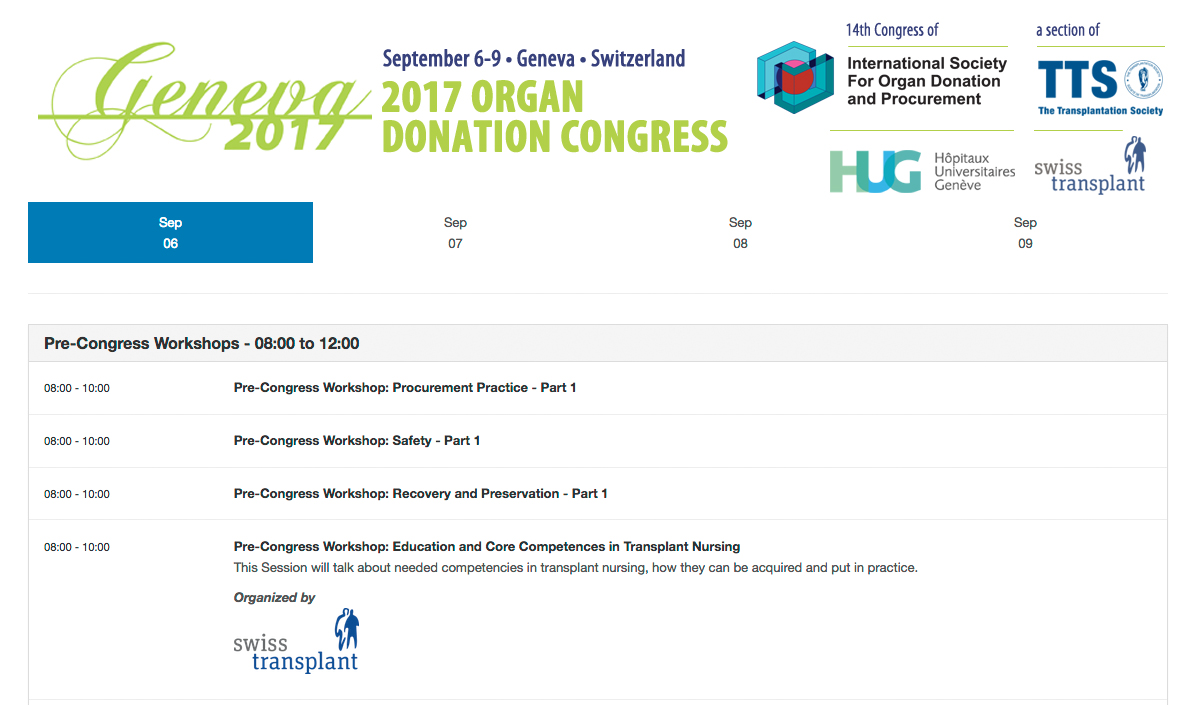
Plenary Session 1 Speakers Revealed!
Improving Patient Outcomes - Organ Donation
Challenges to improving deceased organ donation - past, present and future
Rafael Matesanz, Spain
Founder, National Transplant Organization Madrid
Molecular therapeutic targets to minimise ischemia reperfusion injury
Carmen Peralta, Spain
Institut d'investigacions Biomèdiques August Pi i Sunyer
Normothermic perfusion – Will it live up to its promise
Peter J. Friend, UK
Professor of Transplantation, University of Oxford
Visit www.tts2018.org to for more details
Transplantation Direct - Largest Issue to Date!

This month brings the largest issue of Transplantation Direct we have published to date. Several articles concentrate on early factors affecting kidney transplant outcomes including EBV load/PTLD, cold-ischemia times in circulatory death and small pediatric donors, inflammation in extended criteria donors, and ABO/HLA incompatibility. Sirolimus effects on T cells in UV-exposed skin and the relationship of specific microRNAs to acute rejection are also explored in renal transplantation. In liver transplantation, factors influencing outcomes are studied including fever/pancytopenia, donor diabetes/cold ischemia times, body mass index and donor age/graft volume in elderly living donor recipients. A prospective randomized multicenter trial on liver perfusion method is reported, as well as outcomes in liver transplant recipients with autoimmune disease not receiving steroids. We also publish a report on a pancreas transplant surgery repair method, and on a method of hepatocyte cell preservation for cell transplantation. In heart transplantation, the issue of frailty after bridge-to-transplant is investigated. Finally, a preconditioning tolerance protocol in porcine lung transplantation involving splenocyte infusion is also described herein. We are pleased with the steady progress of Transplantation Direct and hope that it is serving you well.
Transplantation Journal - Featured Article
Submitted by Dr Joel Adler, Editorial Fellow, Transplantation.
What Is the Future of Generics in Transplantation?van Gelder T.
Transplantation. 2015 ;99(11):2269-73.
Given the long-term need for immunosuppressive medication, use of lower-cost generic therapeutics is of interest to transplant recipients. Regulatory procedures, market penetration, and the use of generic immunosuppressive drugs vary across countries. Van Gelder examines the current state of generic antihypertensives, including clinical trials, registration protocols, patient adherence, and cost. Given the narrow therapeutic window of these medications, all of these factors must be taken into careful consideration.
IN THE NEWS
In a first, Okayama hospital combines healthy parts of donor’s lungs to make one for transplant
OKAYAMA – In a world first, Okayama University Hospital has succeeded in combining parts of a brain-dead donor’s lungs to make one lung and transplanted it into a woman in her 50s.
Lymphopenia a Risk for PJP
July 2 - Patients with systemic autoimmune rheumatic diseases who develop Pneumocystic jirovecii pneumonia (PJP) were more likely to be lymphopenic compared with age-, sex-, and disease-matched controls, and this was independent of corticosteroid use, a case-control study found.
Researchers develop microneedle patch for flu vaccination
June 27 - A team at the Georgia Institute of Technology and Emory University has shown that an influenza vaccine can produce robust immune responses and be administered safely with an experimental patch of dissolving microneedles. The method is an alternative to needle-and-syringe immunization; with further development, it could eliminate the discomfort of an injection as well as the inconvenience and expense of visiting a flu clinic.
After surgically removing a tumor from a cancer patient, doctors like to send off some of the tissue for evaluation by a pathologist to get a better idea of whether the margins are cancer free and to guide further treatment decisions. But for technical reasons, completing the pathology report can take days, much to the frustration of patients and their families. Sometimes the results even require an additional surgical procedure.
Tumor Scanner Promises Fast 3D Imaging of Biopsies
Now, NIH-funded researchers have developed a groundbreaking new microscope to help perform the pathology in minutes, not days. How’s that possible? The device works like a scanner for tissues, using a thin sheet of light to capture a series of thin cross sections within a tumor specimen without having to section it with a knife, as is done with conventional pathology. The rapidly acquired 2D “optical sections” are processed by a computer that assembles them into a high-resolution 3D image for immediate analysis.
New HEART& LUNG Committee
TTS has created a Heart and Lung Committee at the beginning of 2017 (Chair: Peter MacDonald - Australia; Members: Tobias Deuse - United States, Shaf Keshavjee - Canada, Christian Benden - Switzerland, Peter Hopkins - Australia, Kumud Dhital - Australia)to provide relevance, opportunity and representation for heart and lung professionals worldwide. At an international level, there are ample opportunities within the group for: learning from each other, establishing clinical and research collaborations and creating additional networks for mentorship and training.
Interested in being a part of the Heart and Lung Committee? Email us at committees@tts.org.
ISODP 2017 - ORGAN DONATION CONGRESS
Detailed program now available!
Young Members Corner
MEDICAL STUDENTS' PERSPECTIVES REGARDING ORGAN TRANSPLANTATION: BACK TO THE GRASS ROOTS!
Sobnach S, Muller E.
Transplant Unit & Division of General Surgery, Groote Schuur Hospital / University of Cape Town, Anzio Road, Cape Town 7925
The South African transplant context in unique; the junior doctor is often the first point of contact between a potential donor and the organ procurement team. Over the past decade, we studied the perspectives of our medical students regarding organ transplantation, with a view to integrating a formal training program in the current undergraduate medical curriculum. Only 8% of our medical students are registered organ donors, and only 18% know how to access transplant resources for their future patients. Although the great majority (95%) are willing to further their education regarding transplant issues, our surveys have concluded that consistently low levels of knowledge prevail amongst our medical student population. Only 6% were fully aware of the organ transplants performed in South Africa. Our greatest concern is that only half of our graduating medical students can confidently perform brain death testing and confirm its diagnosis. Our institution now offers transplantation lectures to medical students during their clerkships. We have also consistently emphasized to medical educators that Organ Transplantation in South Africa is not a subspecialized field, but rather a major public health challenge that needs to be addressed at the grass root
JULY 21: TID 2017 - Early Bird Registration Deadline
Contact
Address
The Transplantation Society
International Headquarters
740 Notre-Dame Ouest
Suite 1245
Montréal, QC, H3C 3X6
Canada
Используйте Вавада казино для игры с бонусом — активируйте промокод и начните выигрывать уже сегодня!








